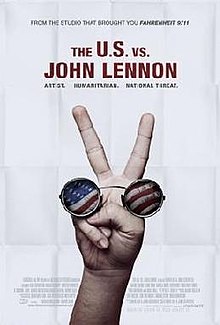The U.S. vs. John Lennon
| The U.S. vs. John Lennon | |
|---|---|
 |
|
| Directed by |
David Leaf John Scheinfeld |
| Produced by | David Leaf John Scheinfeld |
| Written by | David Leaf John Scheinfeld |
| Starring | see cast section |
| Music by | John Lennon |
| Cinematography | James Mathers |
| Edited by | Peter S. Lynch II |
|
Production
company |
Authorized Pictures
|
| Distributed by | Lionsgate |
|
Release date
|
|
|
Running time
|
99 minutes |
| Country | United States |
| Language | English |
| Box office | $1,408,065 |
The U.S. vs. John Lennon is a 2006 documentary film about English musician John Lennon's transformation from a member of The Beatles to a rallying anti-war activist striving for world peace during the late 1960s and early 1970s. The film also details the attempts by the United States government under President Richard Nixon to silence him. The film had its world premiere at the Venice Film Festival and its North American premiere at the Toronto International Film Festival. It was released in New York City and Los Angeles, California on 15 September 2006, and had a nationwide release on 29 September. A soundtrack composed of John Lennon tracks was released by Capitol Records and EMI on 26 September 2006.
The film makes extensive use of archival footage of Lennon and Yoko Ono, and includes a famously hard-hitting interview conducted by anti-war reporter Gloria Emerson.
The U.K. release was on December 8, 2006, 26 years to the day after the death of John Lennon. The DVD was released on February 13, 2007 in the United States. The film made its cable television debut in the U.S. on August 18, 2007 on VH1 Classic.
The film explores the political activism that Lennon became strongly involved in with the Beatles, and after the band ended.
John Lennon is established as being a potential political threat to the American government, and therefore much of the film covers the theme of 'silencing' him and other popular figures that became involved in anti-war activism. Throughout the film the audience can see both sides of the situation: the audience sees the protests and events Lennon and Yoko Ono organised, such as the famous "Give Peace a Chance" rally and concepts such as bagism and bed peace.
...
Wikipedia
